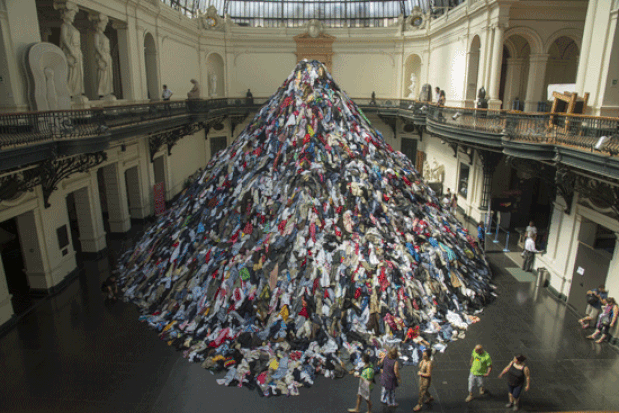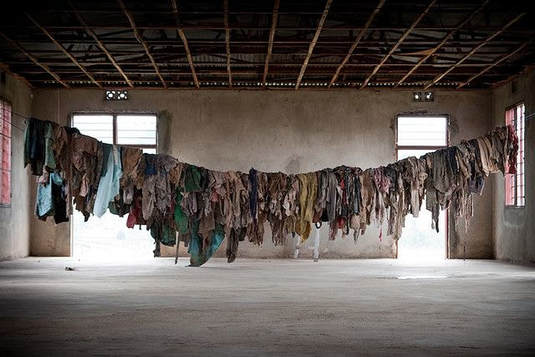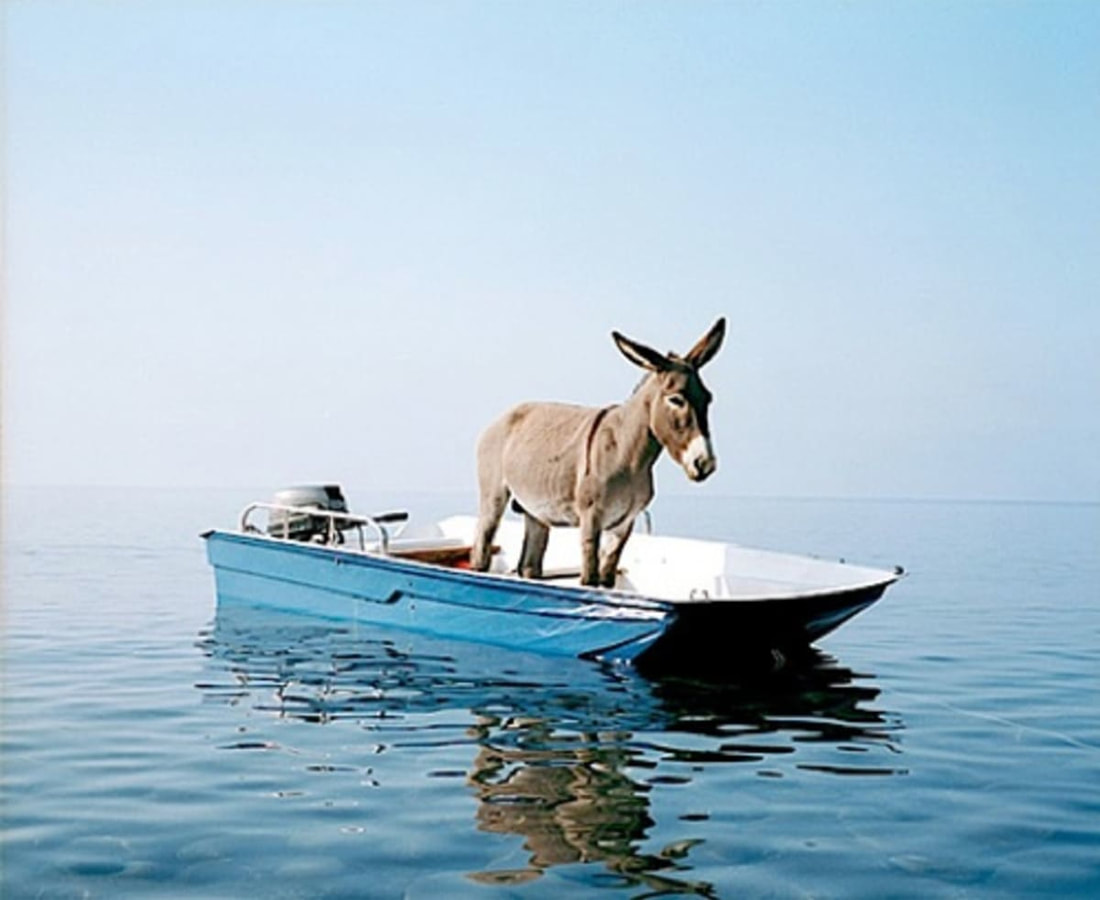ARE WE STRUGGLING TO REPAIR WHAT'S BEEN DONE IN THE PAST, OR ARE WE NEGOTIATING THE PRICE OF ITS INTEGRATION?Sometimes a man stands up during supper and walks outdoors, and keeps on walking, because of a church that stands somewhere in the East. And his children say blessings on him as if he were dead. And another man, who remains inside his own house, stays there, inside the dishes and in the glasses, so that his children have to go far out into the world toward that same church, which he forgot. - Rainer Maria Rilke This post is an experiment in resourcing collective wisdom via social-media discussions. This and another few related conversations was had on my facebook wall in November of 2017. Usually, such rich discussions eventually peter out and get lost in the hard-to find backlog of old posts, the focus always being on the new and immediate. As a longing for the archiving of community wisdom and resilience, I'm making this conversation available again in this format and hope that it may serve as a resource for related research, conversations, and resilience. ORIGINAL POST: Coming out of the richness of several conversations on here, I'm circling around an insight into two significant but different desires within social justice communities and those who want to take some form of action to engender a more just society. I'm feeling like at least a significant portion of inter-community conflicts that come up could very well stem from two very different goals, while those involved are assuming that they're working towards the exact same goal. As always, the difference for me comes down to verbs and their etymology, which I feel often reveals the underlying relationships being advocated for or embodied by those concerned. I see one desire or approach being that of Reparations. The other desire or approach is that of Redemption. I'd ask that you leave some space to not immediately go into the most popular contemporary associations of these words, like political movements in the US regarding the African slave trade, or religious/Christian undertones around redemption and sin, but to allow these words to have a life of their own and recognize that they have been around for hundreds, probably thousands of years at their roots, and that they signify two very different qualities of relationship and this is why we retain two specific words for each quality of relationship. The etymology of reparations is clear in the word itself -- to repair, to fix, to mend. To me, this desire is already freighted with the narrative that something is broken, that something happened that shouldn't have happened, and that something needs to be done to restore that original unbrokeness or wholeness or rightness. It implies a potential for going back, for a redo, for fixing things and putting things 'right.' This gesture also implies that in seeking to repair, one knows what the reason for the brokeness is, and how to fix it, and how things 'should' be. I recognize this approach in a lot of therapy work, diagnostic models, and approaches to social justice that involve fixing society or culture. It places oneself at the centre of the narrative, as having the agency and capacity to fix things. I don't mean to shame or dismiss this desire -- I know it well in myself and it's by far the most familiar go-to impulse in the face of injustice. The etymology of redeem is trickier...it means something like 'to buy back, to ransom, to release.' It places the emphasis on the thing, or person, or culture, or history that is being redeemed, rather than yourself. It also necessitates some form of exchange -- a transaction -- that you yourself must *give* something of yourself in order to buy back that which is to be redeemed -- you have some skin in the game, so to say. Something *must* be lost, in order to release the thing which you care about and desire to be redeemed. To me, this is also deeply relational, and intimately personal. I feel that we have so few models of redemptive justice. And I'm wondering about the relationship between redemption and reparation -- what is the quality of grief required for one to forego a need for reparations, and to develop the capacity for redemption? It's an immense sense of dying in order to release the need for things to be fixed or set right or to happen some way other than how they already have. I'm wondering how this knowledge and discernment in the face of conflicts or divergent tactics might support more understanding and compassion, and a recognition that people may be working for different goals, in their own way, in their own time and in their own process of development and capacity. Thoughts, insights, feedback, comments, all are welcome as I work to untangle what this all means to me and my relationships to justice, trauma, activism and compassion. Matthew Stillman quick thought - I love redemptive justice and all that you are conjuring around it... AND what if the earlier state that is being redeemed was broken and unjust? Transformative justice is implicitly invoked when talking about redemptive or restorative justice but it might need to be more explicit too.
Christos Galanis Matthew, your insights remind me the absurdity of restorative conservation projects along the Rio Grande in New Mexico that I was involved with for a while...the Pueblo people wanted to reintroduce tree and plant species that pre-dated European contact. The hispanics wanted to reintroduce species that predated Anglo conquest. Hunters and libertarians wanted to restore peregrine falcons that had not been seen in the area for over 100 years. Conservationists wanted to reintroduce a species of tortoise that hadn't existed in that landscape since the Pleistocene era. My point being I suppose that all acts of memorial are in themselves political, and this is why I'm fascinated by this idea of redemption as something that can only be based in the present and in direct relationship between oneself, or a community, and the thing being redeemed in the exchange. There's some really tricky stuff around the nature and metaphysics of time and temporality in here that i won't go into right now
Dare Sohei im writing this with the intent that it will help me get clear on the transactionality of grieving: the fundamental technique here is journeying/trance work, in relation with what the Aboriginals call the Dreaming, what i am calling The Imagination. the capitalizations are important because this is animism, and these are alive places, not some ability we own. there is no "my imagination". there is only The Imagination and i have the capacity to access it. Access in this context is the "cure" for the 'crisis of imagination' that trauma incurs. another important principle here is something i got from jodorowsky: "the past wants the future to make sense, but it's the future that gives meaning to the past." to me, this "explains" how mythopoeisis "works". In trauma states, one can cognitively grasp that there are other feelings available, but one cant seem to access them "in real life". somatics and other forms of journeying work create a Temporary Autonomous Zone where access is re-enabled. the tricky part of birth and early childhood trauma is that we lose access early to some fundamental connection to "source" before we have a chance to really encode the skill of it. journey work allows access to the felt sense of our "original self/selves" and also our "future self/selves" at the same time. journey work specifically dealing with repairing the health and building good present time relations with the ancestors allows access to a felt sense of belonging, which is a core component of what i am calling Nurturance. in my experience, it's this mega-meta-prima-state of nurturance that creates what we call resiliency. in order for me to have felt sense access to this, i had to move through a lot of grieving, become a channel for grieving, and learn to surrender to grieving when it arises in my experience. (this is not easy because surrender and grieving are direct relationships with Death, who is an alive being) aka the more i want to access a healed state, the more i actually have to release and let go of: my opinions, my desires, expectations, etc. this overview isnt complete but it is a start. in closing, what i want to say is that this kind of animism, that includes sensory awareness of other kinds of beings, is radical AF to colonial thought. it literally kills it with kindness.
Christos Galanis Perhaps the grief undertaken in the face of letting go of the idea of restoring or fixing the thing you perceive as broken is in itself an essential component of the price you're willing to pay to redeem something/someone...
Jared Williams Who is we? I guess this brings up Bethany's response from the previous post thread. Is what you're alluding to agreed upon methods for redemptive, reparative or restorative ritual of sorts? Because other than throwing money at a thing it's hard for me to imagine any agreed upon method for these things that would be meaningful across any spectrum of cultures or experiences. I'm not saying all hope is lost or anything but, prior to the globalization of the past 100+ years, each and every culture had agreed upon methods for healing, punishing, cleaning, redeeming and renewing a person, a village, a spirit, a landscape and, though many of them were imperfect, they largely worked because the isolation of that culture allowed for it to be true to everyone involved.... we don't have that anymore really, and in the places that do, there's the internet, so that will soon end it. I think there might be a way I just can't see it, especially w how fast things are changing. I mean, there are hardly even agreed upon representatives of groups anymore so who even organizes a thing?? Perhaps there is a way though... I will chew.
Bruce Hooke I'd be interested to hear a bit more about how you have seen those two models coming into conflict. In the process I'm closest to right now it does seem like "reparations" is being used to mean something closer to "redemption" (based on your definitions of these terms) but I have not (yet) seen that lead to conflict.
Bruce Hooke One way to approach this would be to keep bringing it down to the present. How have the ways I live my life (including the ways I've been able to live simply because I'm white) impacted other people alive today? You can't understand this without the context of the past but the final goal is not to address some uncertain time in the past but to address the present. This means that at a certain point, when so much history has gone by that it's no longer clear how a past act impacted present people then talk of reparations is no longer relevant. For example, while the Norman Conquest clearly still shapes the character of Britain today, it's no longer possible to parse out how some people alive today benefited while others are still on the losing side. On the Native American example, again, bring it down to the present. The idea isn't to try to make things the way were when white people first arrived in North America. The idea should be to say "wow, the results of how the white invaders treated the Native Americas is still being felt today. For example, the Native Americans were commonly forced off the good land and given the worst land." What can we do to give the Native Americans a better shot at a good life today, without forcing them to give up their culture? With African-North Americans (and African-Europeans) there are all sorts of ways in which past history impacts life today. Again, bring it to the present. If you stop with "what did my ancestors do" then it doesn't work. You have to ask "what did people who like me do in the past that has given me advantages in life right now and disadvantaged other people right now?"
Bethany Reivich a 'redemption' other than of the self smells of superficiality and commerce, so yes, letting go of these attachments/delusions seems wise, but there are always more where they came from.... And again, as Jared pointed out, the 'we' business continues to be the biggest hurdle in real dialogue. Dialogue doesn't stray too far from the minuscule, and the subjective; it connects the self to bigger, but it doesn't rest there -- that's always the work. my feel of the word 'redemption' (I prefer playful word use) is a powerful collection of jumbled messes that never before came together, into the recognition of my own soul and my particular, ecstatic value and meaning in this world, and in a exalted temporality that itself "repairs" the past... so yes, that's the long work of wounding, mistakes, disorientation, weaving, etc and the recognition (made possible by an unseen, but also somehow intimate hand) of one's place and meaning, and most importantly a physiological embodiment of soul -- a physical feeling/knowing, not only an idea. Which is organic , nonlinear, and multi-layered (and basically mystical). To work with this systematically has something to do with engaging intimately on public levels, of embodying and demonstrating sensitive, subjective dialogue that enfolds itself in nuance, rather than (for ex) well meaning and altruistic white-washings or wishings of premature unity. Also the reverse, of bringing the macro into the micro -- or larger questions/dialogue into intimate life. A figurehead, a friend, or a ritual (even a mundane performative act), can catalyze individuals, similar to a sort of shaktipat or laying of hands -- the expression of deep wisdom by another awakens our own, in all its intricacies, that the precise teaching of correct jargon or etiquette special to particular cultural identities cannot. That's just an example of somatic knowing. So yes, the point is the somatic sense rights itself when all else is lost. (Part of healing is to intimately visit the avoided wound, which collectively seems deeper and deeper down ... into its inherent emptiness? i.e. relating to our own madness) And maybe it wont right itself until all, in fact, is lost (our minds,at least, probably those dont get lost til other things do though_), because until then, the intellectual, abstract continues to distract radical embodiment, collectively.... And trauma (a type of loss) without a map to get out (intellectual disorientation), is itself a very important door into that somatic knowing
Ben Spatz Just FYI Articles: If ‘indigenizing’ education feels this good, we aren’t doing it right Becoming Indigenous: The rise of Eastern Métis in Canada
Ben Robins Absolution: Dealing with an issue by making it go away. Resolution: Dealing with an issue by coming together. Mandy Edwards Hmmm. Apologies if I have totally misunderstood the discussion. But have you ever heard/ read up about the practice of Ho’po’ono’ono? It’s a powerful construct used by certain communities where the tribe takes complete responsibility for the misdemeanours of ANY of its members. Regardless. They ALL reparate and there is a specific prayer that is used. Here is one link that explains it:http://upliftconnect.com/hawaiian-practice-of-forgiveness/. I don’t know if this adds anything. After being taught by Stephen (1 class in - next one in Iceland and I can’t wait!), I am only just starting to ‘wake up’ and feel my way in such things. I’ve never had the confidence before to form my own opinions on such matters. But now I can see how important it is to start thinking and having such discussions. An ant can move a mountain one grain of mud at a time. And the only way we can influence change is by first, exploring who we are and what we stand for in this world. I thank you for this opportunity
Alisa Esposito I can only answer addressing my people and my place. There has been redemption with the burial of my husband and our dear Z and kinship made through their bodies becoming our ground. I cannot speak to social justice movements or society or global anything. I have no caring for that, I cannot bear witness to an abstraction. I have no will to attempt to repair or redeem what I have no love relationship to. I trust other humans to manage work of obligation and love where they live. I have been woven in here and I didn't ask for it, I'd say work of redemption is not a thing that can be chosen but which chooses u. Like Martin Shaw has said, it's the point at which you understand that you are being dreamt, rather than doing the dreaming.....Through my being woven in here, painfully and beautifully and actually quite forcefully, I've been redeemed and my work is intensely obligated in tending to a deep hyperlocal relationship. I've become a midwife of land and people in a real place, seen and unseen. I don't know how to translate such into a more "just world." This cannot happen thru any kind of outside regulation or application of justice measures because that takes the trust and relationship out...it happens because it grows....and because you are Told to stay put and tend.
0 Comments
Your comment will be posted after it is approved.
Leave a Reply. |
AuthorChristos Galanis is a Canadian/Greek researcher, teacher and artist currently living in the UK. Archives
November 2019
Categories |



 RSS Feed
RSS Feed
